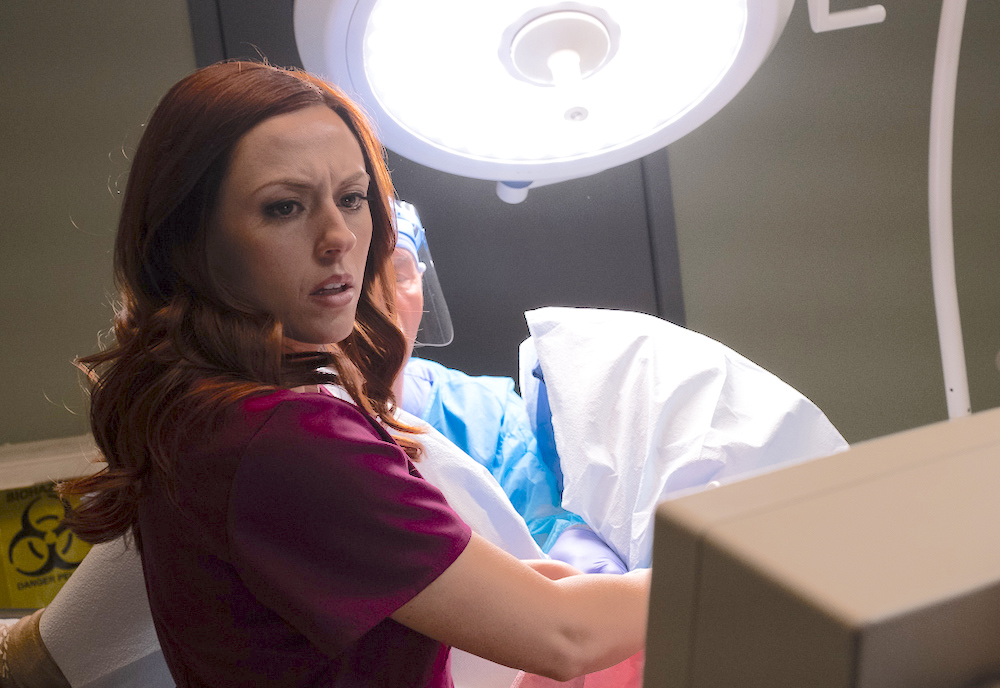Last night, I took my two youngest siblings — both under 17 — to watch an 8 p.m. weeknight showing of an R-rated film.
Don’t worry — the movie was “Unplanned,” and brother and sister are both on spring break this week.
The film’s opening scene is arguably its most disturbing one, the depiction of an abortion seen through an ultrasound monitor and close-up shots of a suction tube collecting human body parts. In it, the protagonist, Abby Johnson, witnesses the “silent scream” that pushed her to finally abandon her career as a Planned Parenthood clinic director.
There were two dramatic, loud reactions inside the movie theater during that powerful scene that I can’t stop thinking about.
One man got out of his seat, yelling “F*** this!” as he stormed out of the theater with a bag of popcorn. He didn’t come back.
Seconds later, a woman began to sob loudly, clearly trying to control her emotions but letting out a brief lament the whole theater could hear.
I will never know why that man with the popcorn left the movie so angrily. Maybe he felt the movie was unfairly going out of its way to stake out a political stance from its start (it did not), or maybe he feared the rest of the film was going to be 90 more minutes of constant blood and guts (it was not). And there’s always the possibility he simply went into that auditorium expecting to see a very different film.
Likewise, I will never know why that woman cried like she did. She stayed for the rest of the film, but despite several more emotionally charged moments, I didn’t hear her again.
In any case, something about that violent moment — likely the moment that helped seal the film’s controversial R-rating from the Motion Picture Association of America — must have stirred something deep inside these two people to provoke this pair of sudden, noisy outbursts.
Whoever they were, I am willing to wager that both of these people have been touched by a real-life experience of abortion.
Perhaps the man with the popcorn knew someone — a family member, a friend — who has had an abortion and perhaps looks back at their decision as the free and legal exercise of a state-given “right,” one worth defending against the millions of Americans who believe abortion to be the ending of an innocent life.
I wondered if that woman’s sobs were the cries of regret, the same cries of women I know, friends and fellow church community members who have bravely spoken out about their experience of abortion and the years-long battle to forgive themselves, and accept the forgiveness of the author of life.
I wondered if that man’s profane outburst was the same expression of frustration at the unplanned events of life that lead us to make quick decisions, decisions that we men sometimes force upon the women in our lives as “sacrifices on the altar of convenience,” in the words of Abby Johnson in “Unplanned.”
There’s some speculation built into what I just wrote, so forgive me for that. But the reality is that if current rates hold up, roughly 1 in 4 American women will have an abortion in their lifetime, according to the Guttmacher Institute, a pro-choice research organization.
Judging by a quick Google search of the statistic, Guttmacher isn’t shy or hesitant to publish that finding. In fact, it is a statistic that abortion rights advocates and organizations like Planned Parenthood gladly share to show that abortion is a “reality,” another medical procedure that’s part of life for women in 21st-century America, and is here to stay for good.
What “Unplanned” does so well is to show the hypocrisy that lies beneath our society’s idolatry of convenience: an idol that we are willing to renounce human life in its earliest stages for in return for our ideal of comfort. And by telling the story of Abby Johnson, it shows that there is another way, that “choosing life” isn’t just a slogan repeated by rosary-praying fanatics, but is in fact the only way society can understand the true meaning of “life, liberty, and the pursuit of happiness.”
In Los Angeles, where I live, thousands of young women and men struggle to find love, a promising future, and, more concretely, an affordable place to live in this wildly overpriced metropolis. For the women, the mere thought of welcoming a newborn child can be frightening, and in the inner-city abortion has often been marketed as the only solution to what they are told will become a never-ending problem.
Meanwhile, the A-list celebrities living just a few miles away freely give their millions to organizations like Planned Parenthood and political campaigns promising to defend “a woman’s right to choose.”
Much has been written about “Unplanned,” including in the magazine I edit, Angelus. And just a few months ago, Abby Johnson (played by Ashley Bratcher in the film) spoke at OneLife LA, a pro-life themed festival and Walk for Life founded by my boss, Archbishop José H. Gomez, four years ago.
But nothing that’s been written about it on social media, blogs, and newspapers, or said on cable television, will stick with me like the pair of very different cries I heard in that theater last night. Cries, I thought, that at least had the chance to be heard.
